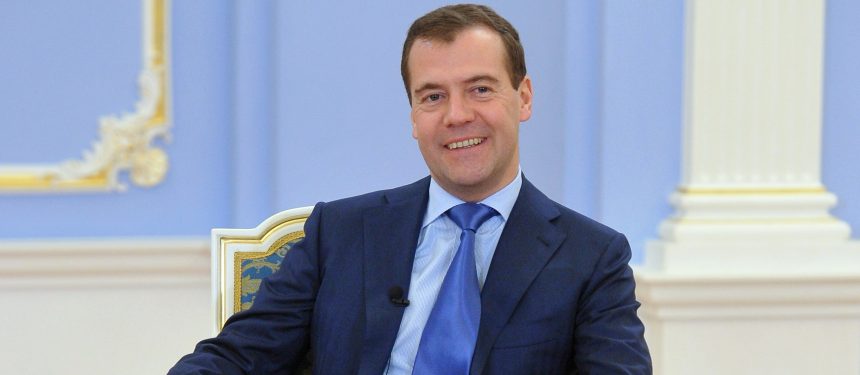The Russian government has unveiled a bold education export strategy that aims to triple the number of international students in the country, which will include intensified marketing efforts, the development of targeted curricula, and potentially a relaxed visa system for international students.
News and business analysis for Professionals in International Education
Have some pie!
Russia unveils strategy to boost education exports fivefold
 Prime Minister Dmitry Medvedev said that developing education exports is “a serious national challenge for our country”. Photo: Press Service and Information Department of the Government of the Russian Federation.
Prime Minister Dmitry Medvedev said that developing education exports is “a serious national challenge for our country”. Photo: Press Service and Information Department of the Government of the Russian Federation. The government will invest 5bn roubles (US$83.5m) in the initiative between now and 2025, in an effort to drive up international student numbers from 220,000 in 2017 to 710,000 in 2025.
The investment, it hopes, will be repaid many times over, boosting annual education exports fivefold to 373bn roubles ($6.2bn) by the end of the project.
“It is clear that competition for foreign students will increase in the coming years”
As well as boosting onshore enrolments, the strategy aims to triple the number of foreign students enrolled in online courses offered by Russian education providers from an estimated 1.1 million in 2016 to 3.5 million.
The initiative will encourage the development of courses targeted at foreign students, including English-taught programs and online courses, as well as an online ‘navigator’ of the Russian education system, and include investment in campus infrastructure and media campaigns.
It will also establish a consortium of leading universities to model internationalisation efforts for the rest of the higher education system.
Twenty universities will take part initially, working to develop study programs aimed at international students and marketing themselves overseas to boost international recruitment, before the planned rollout in 2021 to all of Russia’s universities.
Announcing the project, Prime Minister Dmitry Medvedev said that developing education exports is “a serious national challenge for our country”.
“We have something to offer, something to teach,” he said.
But now that internationalisation of higher education is now a “strategic national priority” for many countries, Russia must make a concerted effort to compete in an increasingly crowded marketplace, he said.
“It is clear that competition for foreign students will increase in the coming years,” he forecasted.
The project is being framed in terms of its monetary benefit to Russia – Medvedev noted that the global market generates “billions of dollars”.
The key aim of the initiative, as outlined in the minutes of a meeting of the Council for Strategic Development and Priority Projects under the President of the Russian Federation last month, is to “increase the share of non-oil exports of the Russian Federation”.
However, Medvedev added that it also entails additional benefits including improved intercultural communication and contacts for domestic students, and the introduction to the labour market of skilled foreign talent.
Internationalising Russia’s universities will require legislative action, particularly in terms of easing the immigration process for students, as well as marketing efforts, he said.
One measure that has already been proposed by the Ministry of Education is to introduce a three-year visa for international students.
International students at Russian universities are currently issued three-month visas that are renewable for up to a year.
“In order to ensure a competitive advantage in the world market of educational programs of Russian universities, it seems justified to provide for the possibility of issuing multiple training visas for not more than three years,” reads a memo from the deputy minister for education and science, Pavel Zenkovich.
“I believe that goals are achievable, but а lot needs to be done”
The export strategy is likely to diversify Russia’s international student intake, particularly from Asia, Africa and Latin America, noted Gulnara Krasnova, leading researcher at the Russian Presidential Academy of National Economy and Public Administration‘s Institute of Applied Economic Research, who took part in the consultation on the new export strategy as an education expert.
At the moment, the majority of international students in Russia come from former Soviet Union states, and therefore don’t require visas.
“I believe that goals are achievable, but а lot needs to be done, including the improvement of the professional skills of international office representatives, the adoption of friendly migration legislation for international students, and implementation of more English programs, marketing research of priority recruitment markets and other activities,” she said.
The minutes of the strategy meeting outline a number of other challenges Russia must overcome in order to meet the stated goals, including high levels of competition from Western countries and China and Russia’s perceived attractiveness globally.
To address these challenges, the initiative will instigate marketing campaigns and liaise with foreign media, alongside concrete incentives to study in the country, such as scholarships.
Increasing the number of foreign faculty on Russian campuses and building more links between Russian and overseas institutions will also help to boost quality and the country’s international education profile, the document notes.
The document also proposes improving campuses infrastructure by modernising buildings and constructing new ones, and looking into “additional models of accommodations for foreign students”, such as hotels.
Still looking? Find by category:


